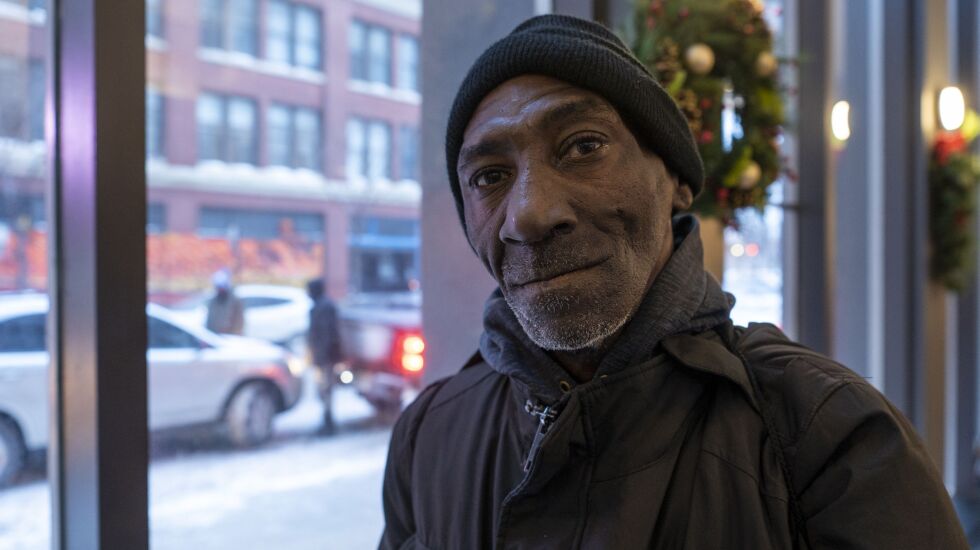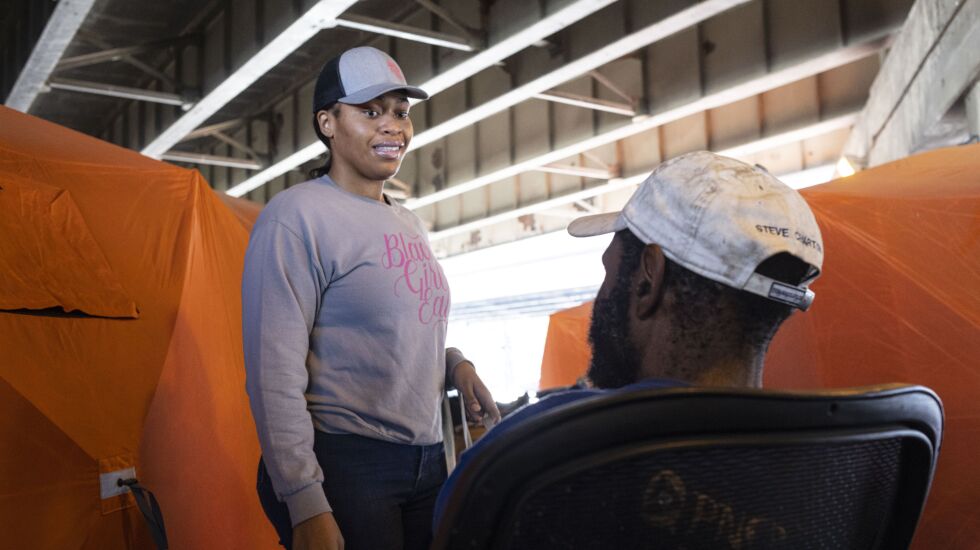
A group seeking shelter from life on the street made reservations at a downtown hotel this week, but it was canceled before they could check in.
Aleta Clark, the woman who brought the group to the Hyatt House in the West Loop, said hotel staff canceled the reservation because of an issue with the booking,then told the group to seek a shelter rather than correcting the error.
Clark and the seven men returned in frustration to a nearby underpass where the group had been staying in tents. But her angst soon gave way to inspiration, as Clark decided it was time to realize a dream she’d had for years— to open a transitional housing center of her own.
“It’s a blessing in disguise,” said Clark, better known as “Englewood Barbie” and the founder of the anti-violence group Hugs No Slugs.
“I’m going to stay with them under the viaduct until I’m able to raise enough money for us to get a shelter. That way, we never need to worry about people kicking us out because of how we look.”
Clark said she planned to stay in a tent of her own at the camp under the Dan Ryan Expressway in Pilsen until she had raised $1 million, which is what she said she needs to open her own ideal center.
She had arrived at the hotel Wednesday, part of her effort to help those she calls “the friends.” The $16,000, month-long stay was paid for by a donor. But she was told the reservations had been canceled because the names appeared “fraudulent,” Clark said.
The staff was then unwilling to let the group rebook and suggested going to a shelter because the hotel manager was not comfortable renting the rooms.
Every paying customer is “supposed to get the same type of f------ respect,” Clark lamented in a video posted to social media afterwards.
A spokesperson for the hotel chain confirmed the reason for the cancellation.
“The reservations were made through a third-party website under the names ‘Friend Friend’ and ‘Universal Fast Delivery’ which raised concerns for the hotel,” according to Jason Ballard, vice president of brand excellence support.
“Hyatt’s purpose is to care for people so that they can be their best, and we are deeply sorry for this experience,” Ballard said. “We apologize the group was made to feel unwelcome upon arrival.”
Hotel leadership would implement training for staff at the hotel in order to prevent a similar experience from happening again, Ballard said.
Ballard said the hotel offered to let the group book a one-week stay, but they declined.
Clark said no such offer was extended.
“The only thing they told me was that they were uncomfortable with them renting the rooms,” Clark said.
The fundraising campaign for the center is already underway, since the donor providing the money for the hotel rooms told Clark to put it toward that effort.

Clark put the same group up in a hotel before the storm that arrived around Christmas. They stayed for two months, until funding ran out.
During that time, she’s helped several from the group get on the Chicago Housing Authority waitlist; two now have housing.
She’s also looked beyond basic needs by celebrating birthdays with the group, holding conflict resolution sessions and shopping for new clothes.
“Outside of just housing them, I want them to start to love and respect themselves again,” she said. “I want them to know that they matter, that people do care about them.”

Clark has documented some of the experience on social media, including bright spots like when Henry Thomas— a 52-year-old member of the group who had been living in a tent under the expressway for about two years — found housing.
The Sun-Times reported on the native of the South Side in November when he was still living at the camp, making money collecting recyclables. Now, he looking for contracting work.
The rest of the group will get CHA housing, Clark hopes, before raising the money for the center, but she is not dissuaded by that possibility.
“There’s friends all throughout Chicago,” she said, referring to the thousands throughout the city that remain unhoused. “This is what real gangster s–t looks like. Being a gangster is helping your people, educating your people, and seeing it through all the way to the end.”
Michael Loria is a staff reporter at the Chicago Sun-Times via Report for America, a not-for-profit journalism program that aims to bolster the paper’s coverage of communities on the South Side and West Side.







